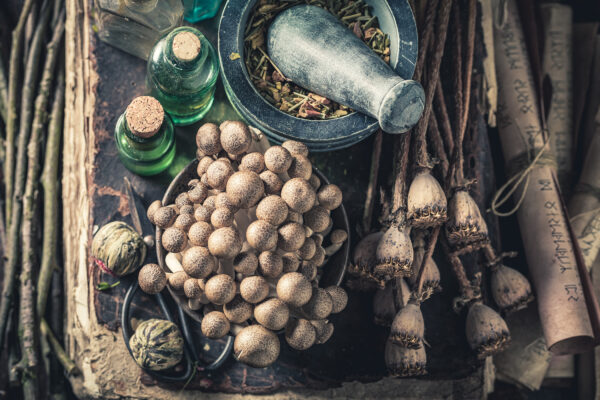What You Can Do to Breathe Easier
By Jamie Bussin featuring Dr. Colleen Hartwick ND
I often joke on the talk show that Toronto has two seasons: cold and allergy. For many people, seasonal allergy symptoms occur in Spring — the season when nature comes alive, and for many of us, so do our allergies. But I also suffer from hay fever in Fall. And this year it has been particularly bad.
I spoke with naturopath, Dr. Colleen Hartwick, about the natural treatment of seasonal allergy symptoms on Episode #332 of The Tonic Talk Show/Podcast. This is a digest of that conversation. Whether you suffer in Spring or Fall, I hope this overview helps.
Understanding What’s Going On Inside
“Allergies represent an overreaction of the immune system,” Dr. Hartwick explains. “Normally, your immune system is there to protect you from harmful invaders like viruses or bacteria. But in the case of seasonal allergies, it mistakenly identifies harmless substances — like pollen — as a threat.”
When that happens, your immune system creates antibodies that attach themselves to the pollen particles. This process activates mast cells, which live under your skin and in your nose, sinuses, and throat. Once triggered, mast cells release histamine, the chemical responsible for all the familiar allergy symptoms — watery eyes, runny nose, sneezing, and congestion.
“Histamine causes blood vessels to swell and leak, and it also irritates nerves,” Dr. Hartwick says. “That’s why your eyes itch and your nose runs — it’s your body trying to flush out what it thinks is dangerous.”
Conventional Relief — and its Limits
Most allergy sufferers head straight to the pharmacy for antihistamines, which block histamine receptors to reduce symptoms like itching, swelling, and congestion. Some also turn to nasal sprays to calm inflammation or HEPA filters to reduce airborne allergens at home.
Others, like me, remember enduring years of allergy shots as kids — small doses of allergens administered over time to help desensitize the immune system.
These conventional options can be effective, but as Dr. Hartwick notes, “There’s also a lot we can do naturally — not instead of, but alongside conventional treatments — to make allergy symptoms far more manageable.”
Lifestyle Strategies to Reduce Exposure
The first and simplest step, she says, is reducing your exposure to allergens. “That could mean investing in a high-quality air filtration system for your home and keeping windows closed during high-pollen days,” she suggested.
One of her favourite strategies is using a neti pot or saline rinse. “Once your sinuses become inflamed, they can trap pollen, creating a vicious cycle of irritation and inflammation,” she explained. “A daily saline rinse literally washes out the pollen, reducing histamine triggers.”
And then there’s stress management. “High stress dysregulates the immune system,” adds Dr. Hartwick. “When stress is elevated, your body can overproduce histamine, worsening symptoms.”
Her advice: Find activities that genuinely calm you down. “For me, that’s rock climbing,” she laughed. “It forces me to stay present. But for others, it could be yoga, deep breathing, or meditation — whatever helps you unwind.”
The Diet Connection
Allergies, at their core, are inflammatory responses — so your diet can make a real difference. “Certain foods can amplify inflammation and worsen allergy symptoms,” Dr. Hartwick explained.
She pointed to dairy as a common culprit. “Dairy products can thicken mucus and make congestion worse. My patients don’t love hearing it, but eliminating dairy during peak allergy months can really help.”
Sugar is another inflammation trigger. “Excess sugar can increase inflammatory chemicals in the body, which may intensify allergic reactions,” she said.
Instead, load your plate with brightly coloured fruits and vegetables, rich in antioxidants and anti-inflammatory compounds. Nutrients like vitamin C and quercetin — found in apples, onions, and berries — act as mast cell stabilizers, meaning they make your body less likely to release histamine in the first place.
I notice my allergies worsen after a glass of red wine. According to Dr. Hartwick,“That makes perfect sense. Fermented foods, including wine, contain histamines. For someone already struggling with histamine overload from allergies, adding more through diet can make symptoms worse.”
Other fermented items — kombucha, kefir, aged cheeses, sauerkraut — might also aggravate symptoms for some people. “These foods are generally healthy, but during allergy season, sensitive individuals might want to cut back,” she said.
Supplements and Herbal Support
For those looking for natural aids, Dr. Hartwick offers a few well-studied options:
- Vitamin C and Quercetin: Both help stabilize mast cells and reduce histamine release.
- Omega-3 Fatty Acids: Found in fish oil and algae, these healthy fats have strong anti-inflammatory properties.
- Spirulina: “This blue-green algae has shown antihistamine effects in some research,” she said.
- Probiotics: “Gut health plays a huge role in immune balance. Certain probiotic strains, like Lactobacillus and Bifidobacterium, can help regulate histamine breakdown and reduce allergic responses.”
Interestingly, she notes that while fermented foods naturally contain probiotics, they also contain histamines — a tricky balance for allergy sufferers. “For some, probiotic supplements may be a better choice during allergy season than relying on fermented foods,” she said.
Daily Practices for Allergy Season
If you’re looking to build a simple daily routine to minimize allergy misery, Dr. Hartwick recommends:
- Wash up frequently — your hands, face, and even hair can carry pollen.
- Shower after being outdoors to remove allergens before bedtime.
- Use a HEPA filter indoors, especially in bedrooms.
- Rinse your sinuses daily with saline or a neti pot.
- Eat clean — avoid inflammatory foods and increase antioxidant intake.
- Manage stress — your immune system performs better when you’re calm.
According to Dr. Hartwick, “All of these small steps add up. They reduce the body’s overall histamine load and inflammation, helping you move through allergy season with less discomfort.”
Breathing Easier
For millions of Canadians, allergy season can feel like a battle against nature. But with a better understanding of what’s happening inside your body — and a few smart, holistic strategies — you can make those months far more bearable.
Allergies may be inevitable for many of us, but suffering doesn’t have to be.




